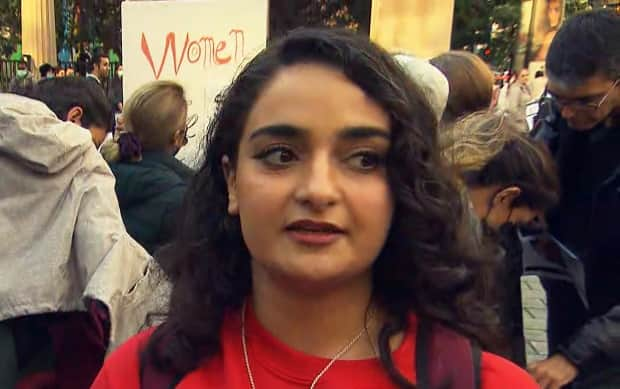Montreal protesters form human chain to honour those killed under Iranian regime

In downtown Montreal on Tuesday afternoon, demonstrators formed a human chain along Sherbrooke Street in front of McGill University's iconic Roddick Gates.
It was a move to honour protesters in Iran who have lost their lives for standing up to that country's regime.
"We want to remember everyone who has been killed or murdered by this brutal regime," Banafsheh Cheraghi told CBC Montreal's Let's Go on Tuesday.
Cheraghi used to be a journalist in Iran and was one of the organizers of the Montreal event. She said participants were holding up photos of those who died under the regime.
"Everyone is really united in this," she said. "We all share this feeling."
The demonstration was one of many across Canada and around the world as protests continue in most of Iran's 31 provinces.
The protests erupted in Iran just over a week ago, after Mahsa Amini, a 22-year-old Kurdish woman, died after falling into a coma following her detention in Tehran by morality police enforcing hijab rules on women's dress.
According to Iran's state media, at least 41 people have been killed during the protests. The state deployed live ammunition against demonstrators and has beefed up security forces in Kurdish areas of western Iran, where the protests have been concentrated.
Standing in solidarity
"Everything started with Mahsa Amini," said Cheraghi. She said this Montreal demonstration felt different than past events as she witnessed a wide variety of voices join together to stand up to the regime.
Shayan Asgharian, president of Concordia University's Iranian Students' Association, also helped organize Tuesday's event and others in recent days.
"It was important to show solidarity and to amplify the voices that are now being cut in Iran," he said.
While access to the web has been limited by the Iranian regime, some information is still getting out as activists find ways around the blackout. Meanwhile, demonstrations have cropped up across Canada over the last week.

For example, thousands of people gathered on the steps of the Vancouver Art Gallery on Sunday, then marched through downtown calling on Iran to end laws that require women to wear hijabs in public. Protesters there were also calling for an end to capital punishment in Iran.
Hundreds of people also took to the streets of Ottawa Sunday to protest against the Iranian government.
In Montreal last week, hundreds gathered on René-Lévesque Boulevard, brandishing signs denouncing the Kurdish woman's death and calling for the freedom of the Iranian people.
Canada takes a stand
Prime Minister Justin Trudeau announced Monday that Canada will levy sanctions on "dozens" of Iranian individuals and entities — including the country's morality police — as security forces in Iran continue to crack down violently on protesters.
"To the women in Iran who are protesting and to those who are supporting them: We are with you," Trudeau said.
"We join our voices — the voices of all Canadians — to the millions of people around the world demanding that the Iranian government listen to its people, end their repression of freedom and rights, and let women and all Iranian people live their lives and express themselves peacefully."
Cheraghi said she wants to see actions that specifically target those in power, since broader sanctions often end up affecting the Iranian people, not their rulers.
Asgharian said those responsible for the atrocities, rather than the Iranian people, should be held accountable and he suggested Canada deport any Iranians on its soil who are connected to the regime.
Wearing a bright red McGill University sweatshirt with her wavy hair cascading down past her shoulders, Parichehr Peyvandy said she was there at the demonstration for "her people."

"It's heartwarming to see people from outside of my country, people who are not my actual people, share that pain and understand the necessity of us standing together and demanding change," she said.
As a woman who lived in Iran and has been arrested for the same reason as Amini, she said that she too could have died in detention. It could have been her sister or cousins, she added.
"It would be just crazy not to say anything, not to do anything, to just stay emotional in silence," said Peyvandy. "Silence doesn't bring change."

 Yahoo Movies
Yahoo Movies 